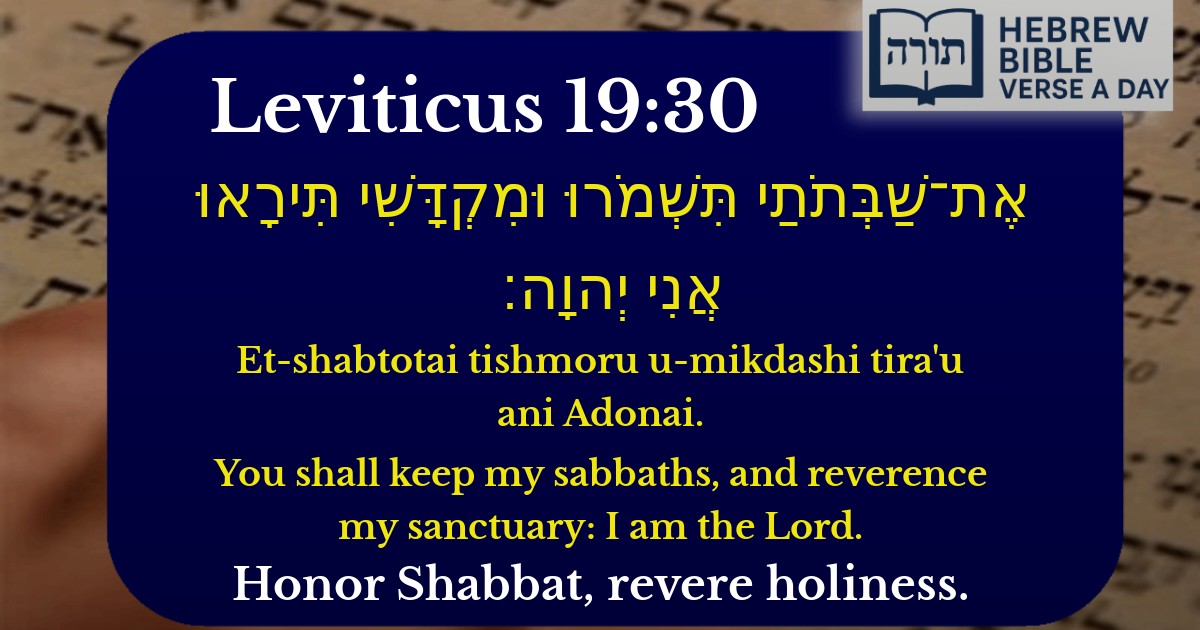Join Our Newsletter To Be Informed When New Videos Are Posted
Join the thousands of fellow Studends who rely on our videos to learn how to read the bible in Hebrew for free!
Hebrew Text
אֶת־שַׁבְּתֹתַי תִּשְׁמֹרוּ וּמִקְדָּשִׁי תִּירָאוּ אֲנִי יְהוָה׃
English Translation
You shall keep my sabbaths, and reverence my sanctuary: I am the Lord.
Transliteration
Et-shabtotai tishmoru u-mikdashi tira'u ani Adonai.
Hebrew Leining Text
אֶת־שַׁבְּתֹתַ֣י תִּשְׁמֹ֔רוּ וּמִקְדָּשִׁ֖י תִּירָ֑אוּ אֲנִ֖י יְהֹוָֽה׃
אֶת־שַׁבְּתֹתַ֣י תִּשְׁמֹ֔רוּ וּמִקְדָּשִׁ֖י תִּירָ֑אוּ אֲנִ֖י יְהֹוָֽה׃
🎵 Listen to leining
Parasha Commentary
📚 Talmud Citations
This verse is quoted in the Talmud.
📖 Yevamot 6a
The verse is cited in a discussion about the sanctity of the Sabbath and the sanctuary, emphasizing the importance of observing these commandments.
📖 Megillah 32b
The verse is referenced in the context of the reverence due to the synagogue, which is considered a minor sanctuary (mikdash me'at).
📖 Sanhedrin 56b
The verse is mentioned in a discussion about the Noahide laws and the universal commandments given to all humanity.


Understanding the Verse in Context
The verse "אֶת־שַׁבְּתֹתַי תִּשְׁמֹרוּ וּמִקְדָּשִׁי תִּירָאוּ אֲנִי יְהוָה" (Vayikra 19:30) appears in Parashat Kedoshim, which outlines numerous mitzvot aimed at sanctifying the Jewish people. The juxtaposition of Shabbat observance and reverence for the Mikdash (Sanctuary) underscores their interconnected spiritual significance.
Shabbat Observance (שַׁבְּתֹתַי תִּשְׁמֹרוּ)
Rashi (Vayikra 19:30) explains that the plural form "שַׁבְּתֹתַי" (My Sabbaths) refers not only to Shabbat itself but also to the festivals (Yamim Tovim), as they are sometimes called "Shabbatot" in the Torah (e.g., Vayikra 23:15). The Rambam (Hilchot Shabbat 30:15) emphasizes that Shabbat is a sign of the covenant between Hashem and Bnei Yisrael, a day to affirm belief in Creation and Divine providence.
Reverence for the Mikdash (וּמִקְדָּשִׁי תִּירָאוּ)
The second half of the verse commands reverence for the Sanctuary. Rashi interprets this as a prohibition against entering the Beit HaMikdash or handling sacred objects in a casual manner (e.g., with unkempt clothing or while intoxicated). The Rambam (Hilchot Beit HaBechirah 7:1-6) elaborates on specific halachot, such as not entering the Temple Mount with a staff or wearing shoes.
The Divine Signature (אֲנִי יְהוָה)
The verse concludes with "אֲנִי יְהוָה", reinforcing that these commandments emanate from Hashem’s authority. The Kli Yakar notes that this phrase appears frequently in Parashat Kedoshim to remind us that holiness is achieved through adherence to mitzvot, which connect us to the Divine.